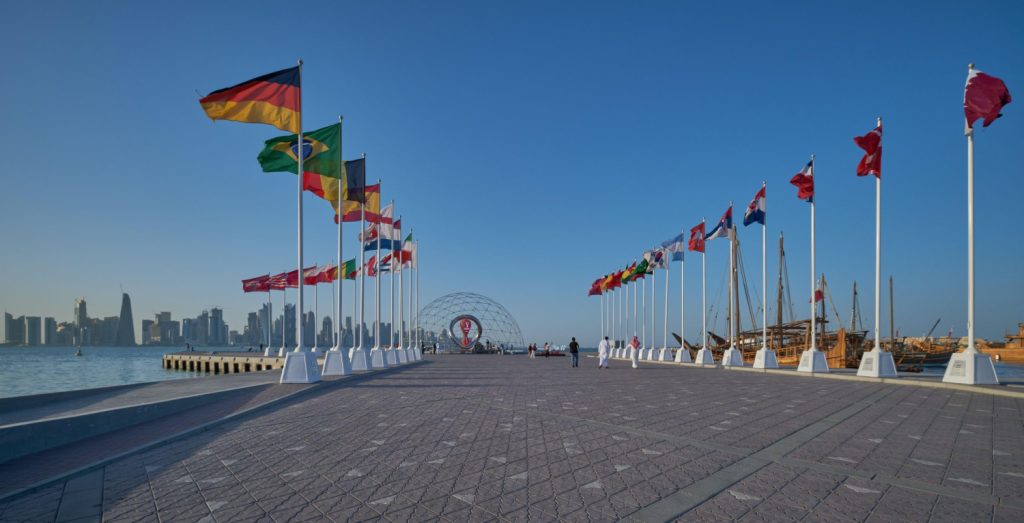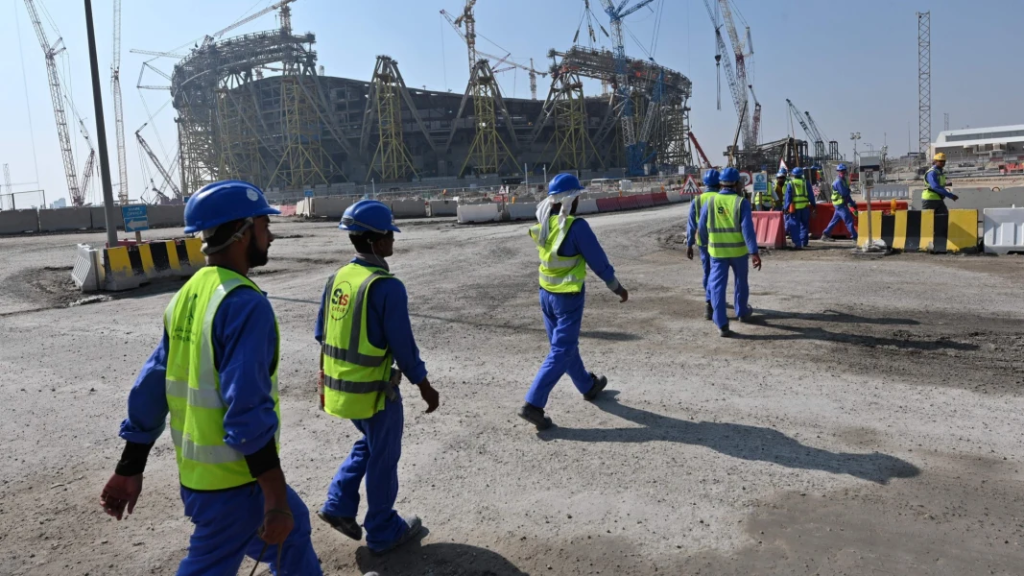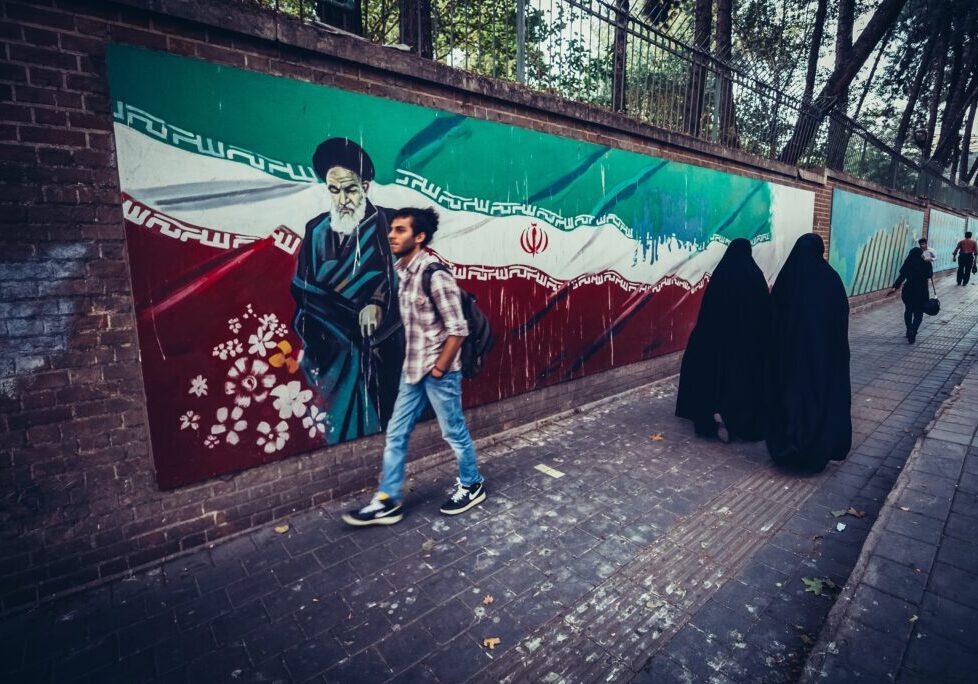Australia/Israel Review
Soccered in?
Dec 14, 2022 | Ash Obel

Inside Qatar’s politicised world cup
DOHA, Qatar – Strolling through Qatar’s capital, it is impossible to escape posters bearing the words “Now is all”, relentlessly plastered on public transportation, in supermarkets, on street signs and in stadiums.
The official slogan for the World Cup, those three distinctly ambiguous words nonetheless seem to embody the mission the Qatari authorities hoped to fulfill by hosting the soccer tournament: focus on the glittering stadiums, world-class athletics and festive fan experience – just don’t think too much about how we got here.
Despite those efforts, Qatar’s history of intolerance for gays, disregard for the rights of migrant workers, and the wider Arab world’s longstanding rejection of Israel have reverberated throughout the competition.
Though tainted with the stench of alleged corruption, soccer’s governing body FIFA framed its awarding of the tournament to the rich Gulf petrostate as an attempt to promote soccer in the Arab world, where the sport’s popularity has been growing steadily for decades.
Unlike previous competitions, the Arab world was well represented at the Middle East’s first-ever World Cup. In Doha’s central thoroughfare, Souq Waqif, the majority of fans were clad in the green and white of Saudi Arabia, the red of Tunisia and Morocco and even a few in the maroon of Qatar.
On the pitch as well, Arab teams excelled, with Morocco becoming the first ever to reach the quarterfinals, and then semi-finals, after Saudi Arabia pulled off a memorable upset win over Argentina in the opening days of the tournament.
After that shock win, social media was flooded with videos showing Arab people celebrating in tribal camps pitched in sandy deserts, coffee shops, or parading through urban streets and alleyways. They were not only in the streets of Riyadh and Jeddah, but Baghdad, Damascus, Cairo, Amman and Hebron as well. Truly an Arab World Cup, delivered as promised.
Alas, not all in the region were invited to join the celebrations. The cold shoulder toward Israelis at the tournament, especially those, like myself, reporting for Israeli publications, was unexpectedly harsh.
With the rapid development of healthy diplomatic relations between Israel and some Arab states in recent years, plus Qatar’s decision to allow Israeli visitors and direct flights from Tel Aviv, I and many other Israeli reporters on the ground in Doha were lulled into thinking those positive developments would extend to the Arab street here. It was not to be.
Instead, Israeli journalists were routinely shunned, hectored or even threatened. Many became the unwilling protagonists in videos circulated proudly on Arabic social media showing fans berating them with insults as they tried to go about their jobs. As one Qatari fan sharply put it, Israelis “are not welcome here.”
For me, one not particularly dramatic incident in the FIFA Media Centre in downtown Doha nonetheless crystallised the rejection. Taking a short break from work, I struck up a conversation with a Yemeni journalist as we both took in a soccer match being broadcast on a large screen.
Together we analysed the match, compared our experiences in Qatar and reminisced about the iconic moments of past tournaments. After five minutes, he asked me who I wrote for. Hearing the answer, his face went pale, and with more than a hint of embarrassment, he simply turned away from me, whispering something in Arabic to his friend beside him, with the word “Israeli” clearly audible.
For all the geopolitical conflicts that may have existed between the home countries of reporters in that room, whether it be Russians and Ukrainians, North and South Koreans or Saudi Arabians and Iranians, an interaction with me, simply because of the name of my publication [Times of Israel], was the dialogue beyond the pale. The word “Israel” turned me from a human and a friend into an enemy in a second.
According to a Haaretz report, tournament organisers instructed stadium security teams to confiscate any flags not belonging to either of the two nations competing in the match. Staff, however, were told that the Palestinian flag was an exception to the rule, and should be permitted to enter all stadiums, despite the Palestinian team not making it to the World Cup.
Not just Israelis
It is these contradictions that have pushed and pulled my perception of the 2022 World Cup. Fans from the briefly unified Arab world celebrating their on- and off-field success together, but to the exclusion of others: Not just Israelis, but also LGBTQ fans and of course the reported 6,500 people unable to enjoy dazzling soccer because they died building the very colosseums the games are being played in.
Speaking to just a handful of Qatar’s nearly three million migrant workers, (though, admittedly, not any in the construction industry,) it was difficult for me to gauge the true feelings and realities of a workforce whose rights and treatment became a major source of consternation surrounding the World Cup.

Estimates are that as many as 6,500 foreign workers have been killed building World Cup infrastructure, though Qatar admits “only” 400 to 500 (Image: Flickr)
Qatar is not exactly renowned as a bastion of free speech, and migrant workers are likely wary of the repercussions of speaking out against their hosts, so encounters must be taken with more than a pinch of salt, but those I spoke to seemed to express a genuine positivity about life in Doha.
While some voiced minor criticisms, notably regarding the oppressive summer heat, most extolled the relatively high wages and what they said was an absence of crime in the country.
Under a baking sun in Doha’s drab outer suburbs, Rashid, a migrant worker from a town near New Delhi in India, explained that his wages, earned operating a cafe in a Doha mall, supported him comfortably, with enough left over to send to his elderly parents back home so they did not have to worry about income.
With a beaming smile, Rashid said he has been able to save enough money to establish a family in the near future, adding confidently that he and his anticipated brood would call Doha “home forever”.
Around the corner, Sanaa from Rabat, Morocco, generously offered me free shawarma from the restaurant she manages, serving the exclusively migrant population living in the surrounding apartment towers. While she does plan to return to her homeland after a five-year stint in the Gulf, Sanaa assured me that “life was good” in Doha. She felt safe as a woman in the country, where an unforgiving authoritarian penal system keeps criminal activity to a minimum.
Most of these workers, however, are employed under the “kafala” sponsorship system, which is used extensively throughout the Gulf and parts of the Middle East. The kafala structure allows employers to maintain extremely high levels of control over their employees, including by confiscating their passports. Employees are housed in overcrowded and unsanitary conditions, and made to work long hours in unsafe summer temperatures. Critics of the system have labelled it akin to modern-day slavery.
According to the Guardian, 6,500 construction workers were killed building World Cup infrastructure up to 2021. Qatari authorities had previously reported the number to be just three, but last week updated their count to “between 400 and 500” people.
In recent years, Qatar, in conjunction with the International Labour Organisation (ILO) has enacted legal reforms granting workers more control over their employment conditions, but the ILO says workers “still face challenges”, and further improvement is needed.
FIFA President Gianni Infantino has often boasted that without the lure of hosting the prestigious tournament, workers’ rights in Qatar would have remained stagnant and inhumane.
It’s hard to believe, though, that workers and human rights were uppermost in the minds of the 22 FIFA Executive Committee members who voted in 2010 to award the competition to Qatar, 16 of whom have been indicted or investigated for alleged corruption or malpractice. While no corruption has ever been directly linked to Qatar, and the Gulf state was cleared by FIFA’s independent ethics committee after a two-year inquiry, widespread allegations of graft and vote-buying have tainted the 2022 World Cup from its earliest days.
Before each match, a giant gold replica of the iconic World Cup trophy is wheeled into the middle of the pitch, the central feature in a hypnotic pre-game display featuring flashing lasers, ferocious bursts of fire and rhythmic music.
Around the world, vast numbers of people, Israelis included, tune in to every match, watching the spectacle with bated breath and intense excitement.
But behind the entrancing lights and beneath the shiny skyscrapers, there’s no mistaking the sight of a tiny oil-rich state seizing the moment to try to launder its image. “Now is all”.
© Times of Israel (www.timesofisrael.org), reprinted by permission, all rights reserved.
Tags: FIFA, Middle East, Qatar, World Cup






